
In the wings of the Senate chamber, first-year Democratic Senator Joe Nguyen runs up to me looking like he’s got something to say. “My favorite part about this job is yelling NO really loudly at Republicans,” he says, before jogging back to his big leather chair on the floor to yell “NO” really loudly at Republicans.
After shouting down another amendment, Sen. Nguyen runs toward me again. “Normally I wear yoga pants on the floor,” he says, holding his laptop casually with one hand, as if it were a dirty dish he was taking back to the sink. The speaker calls another vote and he runs back onto the floor. “NO!” he shouts, before running back to finish his thought.
“I also have a yoga pants jacket,” Nguyen adds. “You know, a jacket made out of yoga pants material, but I figured I would wear a real one for this interview.”
It’s late February, and the Senate is voting on a bill that would transition Washington’s energy grid to 100 percent renewables. (Right now, fossil fuels power about one quarter of the state’s grid.) Because lawmakers only have a finite amount of floor time, Republicans have added 14 bad faith amendments to the bill. The longer they debate the merits of one bullshit amendment or another, the fewer Democratic bills get passed. Nguyen estimates that Republicans had killed 5 or 6 bills before lunchtime. This common parliamentary play pisses Nguyen off, but he also sees Republican obstructionism as a chance to get some work done.
In the middle of the frantic voting process, I follow Nguyen as he steps off the floor, winds his way through the labyrinth of the legislative building, gives a brief speech on the Capitol steps in support of housing advocates, and then runs back to the floor before the speaker calls the next vote.
As I continue to trail Nguyen around Olympia for the rest of the day, I learn that he's got tons of hustle. And a love of athleisure wear. (Or I guess athlegislative wear?) And an Xbox in his office.
And lots of snacks. Plus he says “fuck” a lot. But above all else, he and a few other first-year senators have a desire to change the style and ideological bent of an institution—and a Democratic party, for that matter—that's long been resistant to change.
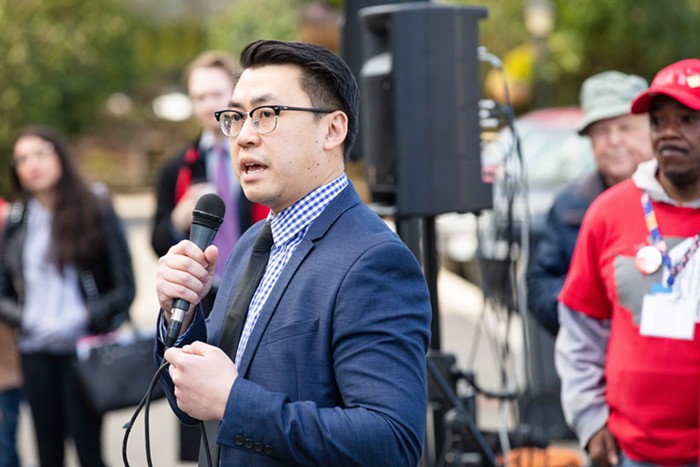
An Infusion of Energy
“He’s such an infusion of energy,” Governor Jay Inslee said of Nguyen in a recent interview. “The clean energy work he’s been doing has been great. He’s been super, just jumping right in and rolling up his sleeves.”
Senate Majority Leader Andy Billig called the entire class of new members "incredibly impressive,” and added that they not only bring a "new level of energy," but also "a new level of perspective from diverse communities and different age ranges that is really important for us to have in the Senate.”
Nguyen doesn’t have Rep. Alexandria Ocasio Cortez's social media following, nor quite her level of prestige, nor is he a woman, but, like AOC, he handily and surprisingly won an election against a political insider in order to become the first person of color to represent his district. He reps the 34th LD, which includes White Center, West Seattle, Burien, Vashon and Maury Islands. He’s also the first Vietnamese American state senator in Washington’s history.
Nguyen was born in White Center to Vietnamese refugees. His family—mom, dad, grandma, three siblings—lived in public housing. They shopped for groceries at the local food bank and picked up toys at the Salvation Army. When his father was paralyzed in a bad car accident, family life reoriented around caring for him while trying to survive on a single income.
Nevertheless, Nguyen became the first person in his family to graduate from college. He landed a job at Microsoft’s Worldwide Learning program, where he focuses on data and analytics.
He now lives in West Seattle with his wife and two kids—a four-year-old and a two-year-old. During session he rents a small house “in the middle of the woods” in Olympia, which cuts down on his commute but keeps him away from his family, which he says is the hardest part of the job.
Under Pressure
Nguyen says the pressure of being the first POC to represent the district is both a privilege and a burden.
A week before he announced his run for office, he sat down for drinks with Seattle City Councilmember Lorena González. He apparently didn’t have his shit in order. González told him as much.
González also reminded him that people of color carry a heavier burden than others because they represent a broader set of communities of color. So, if he really wanted to run, he "better not fuck it up," González said, "because if he did it would make it harder for the next person of color to successfully run and win.”
Nguyen says he agreed with her and delayed his announcement for a week to “shore up some stuff.”
“We don’t have the luxury of a narrative,” Nguyen says. “In a lot of cases, we’re the first and only impression people get."
With that in mind, Nguyen didn't just want to win his first ever election to anything. He wanted to win big.
And he did. He crushed Shannon Braddock, deputy chief of staff for King County Executive Dow Constantine, by over 16 points.
“People still tokenize. They still say I won just because I’m a person of color,” Nguyen said. “But I’m just like—scoreboard.”

"Fuck 'Em. Not Only Do I Belong Here, I'm Going to Thrive Here."
Nguyen is making a big impression in the Senate on a number of different fronts.
His use of technology outpaces a vast majority of his colleagues, some of whom barely know how to use email, Nguyen says.
Like AOC, Nguyen uses his social media feeds to connect with constituents on a regular basis.
In West Wing-style walk-and-talk videos posted to his Facebook page, he updates voters on bills he’s passing, arcane elements of legislative procedure, and he interviews other politicians about issues that affect his district.
He hasn’t quite mastered the medium in the way AOC has, but the videos are so endearing you can’t help but love them. Whether he’s awkwardly interviewing Attorney General Bob Ferguson as they walk around the grounds of the Capitol, or whether he's commiserating with Sen. Emily Randall about a bill that failed, his followers are basically getting a down-to-earth civics lesson about state government. Judging by the comments, people seem appreciative.
He also fires off tweets from the floor of the Senate, which is kind of fun.
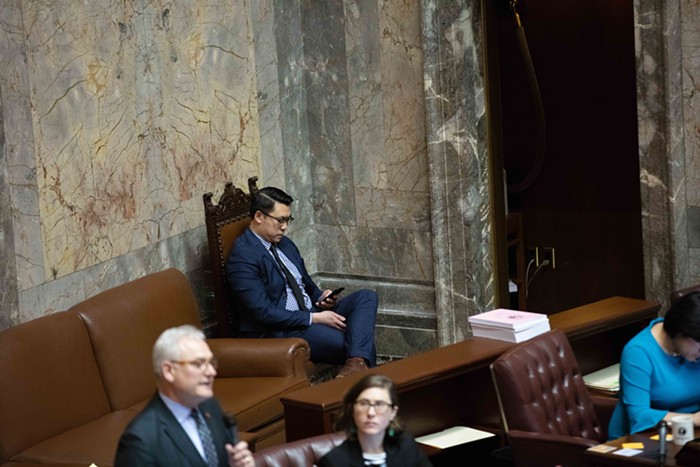
But Nguyen’s real technical innovations are much more mundane.
To take a load off his aides, Nguyen’s office uses an app called Calendly to schedule all his meetings. The office has also connected his email to a data visualization tool that allows him to see what kinds of emails are coming to him and where they’re coming from. If he’s getting 100 template emails asking him to vote for gun restrictions, for instance, he can use the tool to clock that and send identical replies back to the senders. He uses a note-taking app to keep track of bills and reminders, which means he more or less runs a paperless shop. And visitors sign in on a tablet outside his office door, allowing him to follow up more easily after meetings.
“I feel like everything I’m doing is just what any regular-ass person would do,” Nguyen said of his tech. “I’m not trying to waste time.”
Nguyen estimates his use of pretty standard administrative technology saves him and his office 4 hours of busywork per day.
He also never sleeps, which gives him more time not to waste. At this point, it should not surprise you to learn that Nguyen tracks his sleep using an app on his phone. He averages between 4 and 5 hours per sleep a night. He says he typically pops a couple melatonin before bed and then knocks back a tube of Zipfizz when he wakes up in the morning. The “healthy energy drink mix” helps him run all day.
All of these measures mean Nguyen just has more time in the day than a number of his colleagues, he guesses, and he says he uses every single minute of it.
“I don’t think I’m smarter than anyone else. I don’t think I have any special insight outside of my lived experience,” Nguyen says. “But I for sure work harder than most people.”
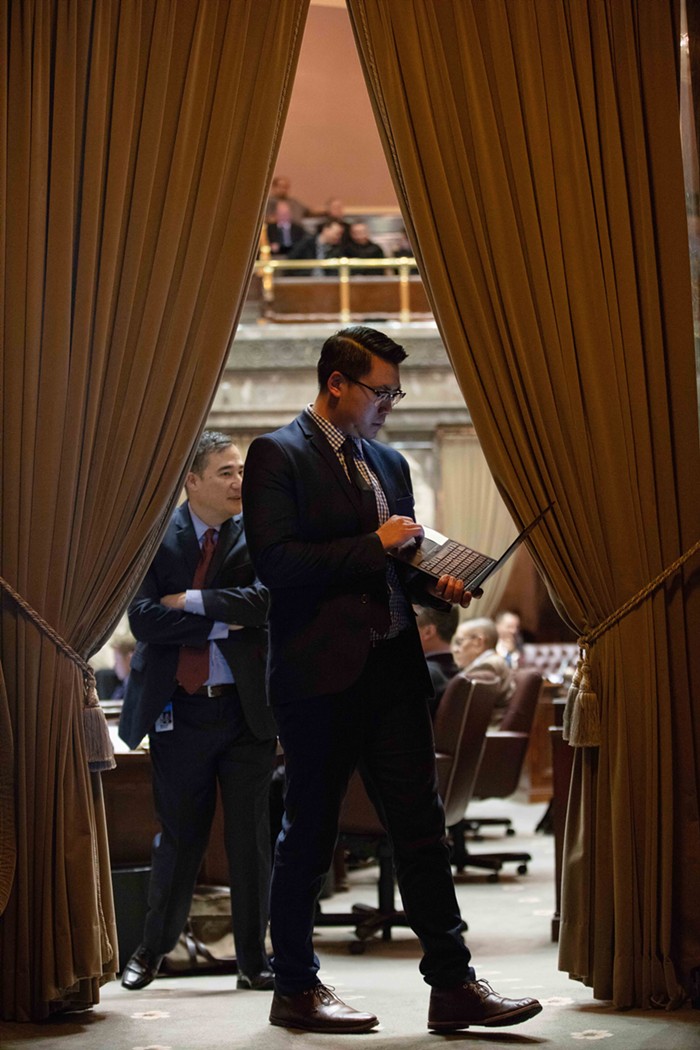
He says he heads into the office at 6:00 a.m. and leaves at 10:00 p.m. Instead of the normal 5 or 6 15-minute meetings per day, Nguyen says his office takes at least 16 meetings per day. He reads and signs onto tons of bills, participates in all the caucus meetings he has to participate in, and of course casts votes on the floor.
One night, Nguyen says, he stayed up studying the tax code. He figured out that lawmakers could exempt 73 percent of businesses in Washington state from the business-and-occupation tax and still raise $2 billion dollars over the course of a two-year budget cycle. The next day he met with leadership and staff, who, he says, smiled on his proposal. According to Nguyen, the work he did that night is driving a lot of the discussion the caucus is now having about progressive changes to the B&O tax.
Nguyen overdoes it on purpose. “I know how this works,” he says. “They’re going to test us and treat us different. The biggest knock on our campaign was my lack of experience. They said I didn’t know what I was doing, that I didn’t belong here, that I wouldn’t be able to hit the ground running. My whole goal has been to say, ‘Fuck ‘em—not only do I belong here, I’m going to thrive here,'” he said.
Nguyen catches himself coming in hot and takes a moment to reflect.
“For me, I feel very privileged,” Nguyen adds. “For as ‘fuck all’ as I am, I actually respect the space and I respect the seat and I respect the people I’m trying to serve, and I take this super serious because for so long people like me have been left out.”
Representing
Though winning his Senate seat was an important "milestone," securing more representation for people of color in the legislature is Nguyen's primary goal. He doesn't even care if he wins again, so long as he can help more people like him get elected.
"It’s not like people don’t care about the issues facing people of color, or that they don’t support them," Nguyen says. “It’s even worse. They don’t know that your issue exists. So it doesn’t become a thing.”
Nguyen’s commitment to representation extends to the kinds of people he taps for guidance.
He regularly confers with Sili Savusa, executive director at the White Center Community Development Association, a nonprofit that “works to eradicate poverty and build a vibrant, economically diverse community.” Other members of his braintrust include Aaron Garcia, who also works at the White Center CDA, and longtime friend and White Center resident Long Phan.
Over email, Savusa said Nguyen calls her “auntie,” a common nickname for elders in the Asian Pacific Islander community. She says she works to “keep elected officials like Sen. Nguyen connected to community voices,” which she says drives their work and gives their work meaning. “As long as this is happening, we can get some real shit done,” she said.
And, in fact, one of Nguyen’s favorite legislative tasks is bringing the voices of his community to groups he doesn’t often agree with—“business lobbyists, oil companies, stuff like that.”
Sometimes senators throw staff at lobbyists they don’t like, but Nguyen flips the script, preferring to meet with them personally.
“I take the meeting with the oil company so the oil company can know what my people think about oil companies,” Nguyen said. “They’re actually really good conversations. I’m lobbying them as much as they’re lobbying me.”
But Nguyen doesn’t spend all his time yelling at oil company lobbyists. David Hlebain, a campaign coordinator for Statewide Poverty Action Network, a nonprofit that organizes on issues impacting poverty and structural racism, says he’s grateful for Nguyen’s (and House Rep. Tana Senn’s) leadership on the group’s efforts to revive Temporary Assistance for Needy Families, a cash assistance program that provides some cash support and child care for families who need it. Nguyen’s family relied on TANF after his dad got in an accident, which he detailed in an op-ed for the Seattle Times, but the program was gutted during the Great Recession, and its coffers haven’t been replenished.
“I just feel like he gets it,” says Hlebain when I asked him how working with Nguyen compares to working with old white guys in the caucus. “With others, you have to explain the extent of the barriers, how limited some of the support and training is, and I feel like for someone like Joe there’s no question. He’s assuming everyone’s doing the best they can, and he’s not concerned with hammering questions to me or other advocates about personal responsibility."
“We’ve had a few champions over the years, but to have basically someone come in as a freshman and say I’m going to take on undoing 10 years of bad policy and try to reverse that—it’s impressive,” Hlebain added. "I just feel like when he commits to championing something he’s in.”
Representation also plays heavily into his legislative process. When Democrats were working on a bill concerning post-conviction review, SB 5819, Nguyen advocated for getting testimony from people serving time at Monroe Correctional Facility. He helped them send in their testimony remotely so lawmakers could hear directly from them. Homeless people at Camp Second Chance, where Nguyen volunteers with his 4-year-old daughter, helped Nguyen craft legislation on Senate Bill 5946, which makes it easier to establish temporary shelters. And on a bill designed to give strippers more protections, SB 5724, Nguyen and Sen. Claire Wilson brought in Stormy Daniels for consultation.
“We’ve brought in perspectives, voices that don’t often have a seat at the table,” Nguyen says of his work with other first-year Democrats. “That’s good for the legislation, but then people also feel that this is actually their process.”
“Otherwise,” he added, “Politicians are just parroting the commentary of lobbyists—and that’s in the best-case scenario.”

The Office with the Swedish Furniture
Though Nguyen has been championing a lot of legislation that deeply affects peoples’ lives, his most notable mark on the Senate thus far has been his interior design choices in his office.
Walk in the front door of any other senator’s office and you will be greeted by a young aide sitting behind a desk. You’ll sit in a sturdy chair as you wait for the senator to meet you. When the time comes you’ll head into the senator’s chambers, which will be decorated with rich mahogany, heavy drapes, upscale partitions, and a lot of other fancy furnishings that seek to project the dignity of the office.
But Nguyen’s office looks like the break room at a start-up.
Nobody greets you when you walk inside. Instead, you sign in electronically with a tablet. While you wait for someone to come say hi, you sit on a long couch or a molded plastic chair from Ikea. You can flip through a couple of books by Pulitzer Prize-winning novelist Viet Thanh Nguyen, or grab one of the many snacks piled up in fishbowls and baskets. A big, flat screen TV rests on a stand opposite the bookshelf. There's an Xbox hooked up below it. Sometimes Nguyen will play FIFA on breaks with his aides. Why? Because it's fucking fun.
Nguyen takes the smallest room in the suite and gives his legislative aide, session aide, and intern the larger room. He’s set up their workroom like an open office, with a large picnic table for group meetings.
No other senator sets up their office like this, but for Nguyen, who describes himself as “an average fucking tech worker” from Microsoft, creating a welcoming space for guests and his team was a no-brainer.
People Before Profit
Nguyen also runs his office a little differently than some of the other senators. At their first all-staff meeting, Nguyen laid out a mission statement, which is apparently another uncommon practice among senators. He said he wanted to be known as the office that "puts people before profit," a familiar refrain from his campaign.
When Ashley Stiles heard that statement, she remembered thinking, “Okay, cool, I’m in the right place. I’m in the right office.”
Stiles is an intern—or, she insists with a knowing smile, a Nguyen-tern—and a junior at Pacific Lutheran University in Tacoma.
This is her first session working in Olympia, and so she didn’t know she was working in a unique office. “People kept coming up here and looking at the furniture, and I’m like ‘I just sit in a picnic table in my office all day—is that not normal?’”
Aside from being “really cool,” Stiles says the office setup makes staff feel a little more comfortable. The open format allows them to bounce ideas off of each other, which is especially nice for Stiles since she’s so new.
Nguyen’s session aide, Emilia Barnecut, a 19-year-old from West Seattle who was in the Junior Statesmen of America Club at Garfield High School, says she feels “very lucky” to be working with Nguyen.
After suffering a traumatic brain injury 5 years ago, Barnecut had to drop out of high school. She lives with chronic migraines and says she still struggles to get her medications sorted out. She doesn’t have the educational experience or the job experience that a lot of people her age have, and she says she’s “almost 100 percent certain” that she’s the least educated person working in Olympia. She doesn’t think she would have been considered for a job in a more traditional office.
But Nguyen says Barnecut already has the skills and the life experience she needs to work in Olympia.
During a debate between Nguyen and Shannon Braddock on Vashon Island, the moderator read a randomly selected audience question that completely eviscerated Braddock. “Damn,” Nguyen thought at the time. “That person is serious.”
On the ferry ride back to Seattle, Nguyen asked his supporters if they knew who wrote that question. Barnecut, who was door-knocking for him at the time, said it was her.
“At that moment I knew she was sweet, super nice, awesome—and yet savage,” Nguyen said. “I was super impressed by her hustle, her intellect, and her ability to take bold stances.”
“I mean, she says she stays up at night reading the PDC,” Nguyen added. “You can pay for tuition, but you can’t teach that stuff.”
Barnecut says it’s “really inspiring" to work for someone like Nguyen, who has also admitted to experiencing imposter syndrome. In his introductory speech, Nguyen said he thought someone was going to stop him before he first walked onto the Senate floor. But nobody did. Barnecut says she can relate. “I get that feeling sometimes where I look around and ask myself, ‘Am I supposed to be here?’”
But despite those feelings of insecurity, she’s perfect for the job. Her familiarity with the tricks of health insurance companies gives her an edge in meetings with health care organizations and disability rights orgs. And in general, she says she likes the “Game of Thrones” feel of working at the statehouse.
“I have to pinch myself a lot,” she said.
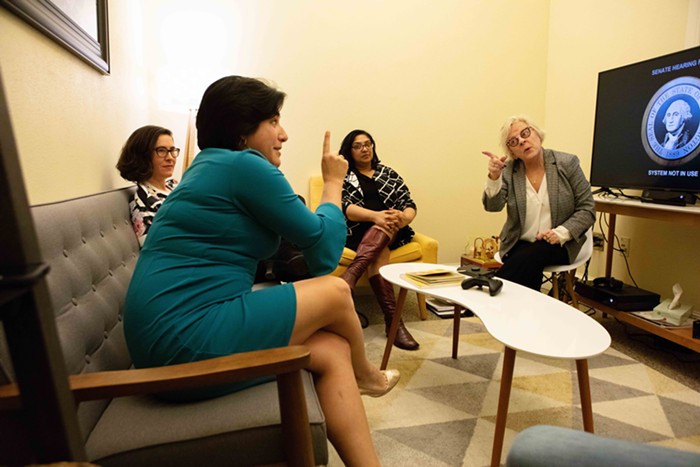
They Made Fun of His Name
Nguyen’s office also serves as a decompression chamber for “the first-year caucus,” an informal caucus composed of Sens Emily Randall, Mona Das, Claire Wilson, Jesse Salomon, and Liz Lovelett and Nguyen.
Randall is a woman of color and the only queer member of the Senate. Das is one of two Indian Americans with a seat. Wilson is a lesbian and a longtime LGBTQ and education advocate. And Lovelett was appointed after Sen. Kevin Ranker resigned in the midst of a sexual harassment investigation. Along with Nguyen, they all contribute to the increasing diversification of the Democratic caucus. Of the 28 Democrats, 19 are now women, people of color, or LGBTQ.
“We’re crushing a lot of things, we’re changing the trajectory,” said Wilson, who knocked off Republican Sen. Mark Miloscia in the 30th Legislative District last year. “We have allies and stakeholders who think that the Senate is more progressive than the house is, which is a very interesting thing. To see things pass through the Senate that would never have passed without us here is a pretty exciting thing to see.”
Though everyone is excited to work on issues the Senate has largely ignored, their visibility exposes them to varying degrees of sexism, racism, and homophobia. And so once a week they gather in Nguyen’s office to snack and blow off steam.
At a recent session I crashed, the senators sat around on the couches and chairs in Nguyen’s office and talked about how to handle some of these challenges. It was late in the week and late in the day, but they had a lot to get off their chests.
In the last few weeks, Republicans had said a bunch of horrendous shit about trans kids on the Senate floor. A couple of Republicans had made fun of Nguyen’s name on the Senate floor, as well. Security staff had mistaken Das for an aide. And though three of the senators won swing districts just last year (Randall, Wilson, and Das), Democratic leadership had spent a lot of time instructing them on which votes they should and shouldn’t take in order to retain their seats.
“As much as I appreciate our colleagues’ investment in our continued leadership, there is an enormous element of perpetuating the patriarchy in this paternalistic care-taking of women,” Sen. Randall said. “I live in an urban area in Seattle, but I really know what the people in Kitsap County care about,” she added in a mocking tone.
There was some shit to say.
But the main topic of conversation was the conflict between speaking their values and legislating their values, as Sen. Salomon put it.
As representatives of their respective marginalized communities, they feel a strong urge to stand up on the floor and defend the dignity of trans children in the face of Republican condescension, for instance. But the more time they spend valiantly shouting down Republicans, the less time they have to pass bills that help the people they’re fighting for.
“They want you to react. They are baiting you. That is part of the strategy,” said Lovelett. “Their whole goal is to wear us down. It’s just a lot of bluster.”
But sometimes the senators feel they have to say something, even if it takes a little time to say. Randall recounted a moment when she stood up to speak during the debate on the trans bullying bill. Republicans were blaming the parents of trans kids for not better preparing them for a life of bullying—apparently unaware of the number of homeless trans kids in schools. They were also saying they didn’t want to pass protections for trans kids because they didn’t want those kids to stick out in class.
Randall couldn’t take all this nonsense. LGBTQ advocates had told several trans kids they worked with to watch TVW (which is like C-SPAN for the state legislature) that day, so Randall knew these kids would be listening to people in power making these ridiculous claims about them. The pressure to say something mounted, and she stood up to speak. But, ultimately, she got the hook from leadership. They had to move on.
“It was hands down the hardest day here so far,” Randall said. “I stood in the wings and cried about the horrors that our young people are facing.”
There was also that time Republicans made fun of Nguyen’s name.
It’s customary for senators to roast newbies after they pass their first bill. When Nguyen passed his first bill, Democratic Sen. Jeannie Darneille ribbed him for introducing Swedish furniture and televisions in his office. Sen. Kaiser complained about the iPad he uses to sign in visitors.
But two Republicans—Sen. Phil Fortunato and Minority Leader Mark Schoesler—made the same dumb joke about the spelling of Nguyen’s name.
“I’d like to know how you get ‘win’ out of Nguyen,” said Fortunato on the floor of the Senate.
“I’m going to work really hard to learn to spell and pronounce member ‘new guy’s’ name, and hopefully by the end of this session he’ll be able to spell and pronounce my name,” said Schoesler, despite the fact that “Nguyen” is the most common Vietnamese last name in the country.
“It’s exhausting, man,” Nguyen said. “When people ridicule my name on the Senate floor. When they make racist comments unknowingly on a regular basis. When I have to explain institutional racism to members of my own caucus sometimes. It gets exhausting.”
But Nguyen finds comfort and catharsis in these “therapy sessions” with the other first-year members. And when he needs extra encouragement, he looks up at a framed photo hanging above the couch in his office. The photo shows a group of Vietnamese refugees in a boat. His mom and his dad are among them. They’d been out on the water for two weeks before the U.S. Coast Guard picked them up and snapped the photo.
“Even when shit gets hard here, I look at that photo and say it can’t be harder than that,” Nguyen said.
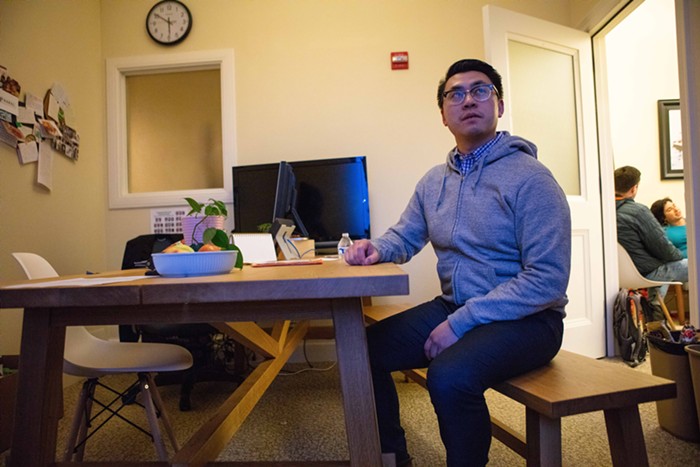
Fuck Four Years from Now
Nguyen says he doesn’t care if he gets reelected. He wants to run the most progressive office in the Senate, and he wants to run it loudly, no matter the potential political consequences.
“Majorities are supposed to be used,” Nguyen said. “I’m tired of a system that oppressed black and brown bodies and poor people. We need shit right now. People are dying right now. People are being pushed out of their homes right now. Fuck four years from now.”
White Center should be proud.



















